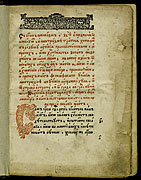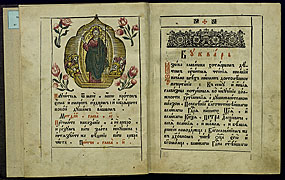A. Voznesensky
16th-17th Century ABC Books, Grammars and Dictionaries
Later Moscow ABC Books
Smotrytsky's grammar was used for the preparation of the Moscow edition undertaken in 1648 (No. 34), nevertheless, the release of this book was not arose from educational projects of the Russian authorities, but from increase in revising activity at the printing house. In Moscow, there was the urgent need for the Grammar: it was important to explain why certain alterations were made in liturgical books. In addition, it was supposed to become a guide for correctors in their future endeavours. The publication of 1648 was the only experience of publishing grammatical aids in Moscow in the 17century, that is why, it continued to be used, including in schools, even during the next century.Moscow publishers preferred to issue ABC books for teaching. In the second half of the century, their contents, as mentioned above, much changed, but the Print Yard continued to produce the most elementary primer in very large numbes. Innovative was publishing "didactic" Readers with "questions" as well as ABC books "with greetings". The first received their name, because they included a "statement of the Orthodox faith, composed of brief questions and answer," ie, a small catechism written in question-answer format by Stephen Zizany (No. 35), The second contained "greetings" representing examples of how to congratulate the family, parents and benefactors on major religious holidays (No. 36).
Publication of ABC books and primers was considered important in the 17th century. Prominent cultural figures of the time contributed to this. Thus, in 1679, the famous enlightener and poet Hieromonk Symeon of Polotsk printed a primer (No. 37), By the end of the century, Karion Istomin, a student of Simeon Polotsky, issued a number of books to teach reading and writing to the Russians. He felt it necessary to publish both the most elementary school book (in 1698), and ABC with extensive texts to read (in 1696, No. 38) as well as a luxury fully engraved edition intended for editing offsprings of wealthy parents (in 1694, No. 39). The New Era has brought reformations in the education system in Russia, and these changes resulted in new books.


